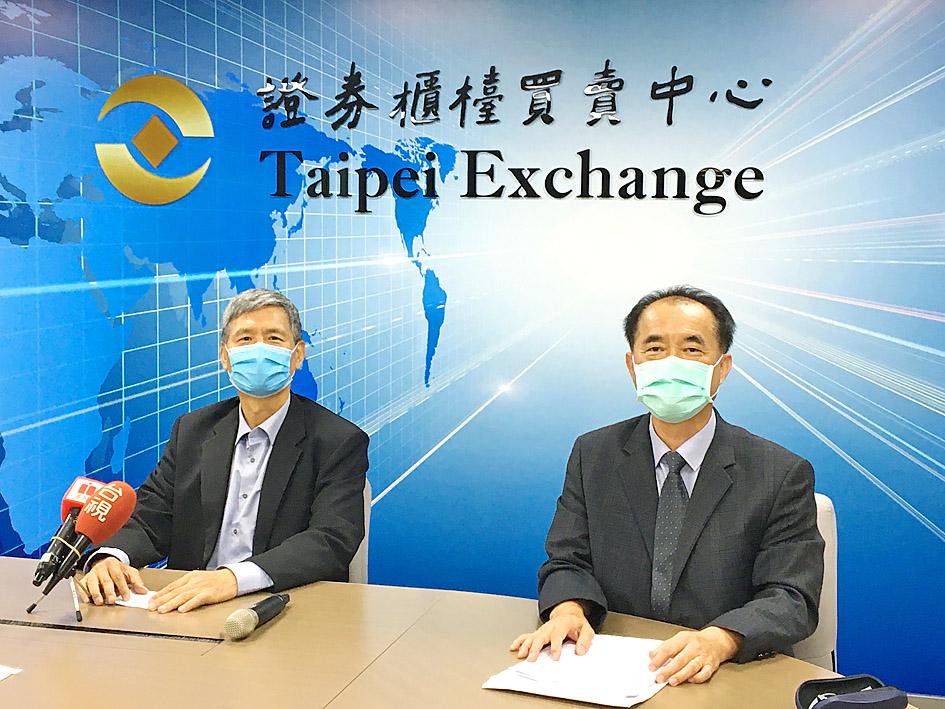Chipbond Technology Corp (頎邦) yesterday said it plans to acquire about a 31 percent stake in Orient Semiconductor Electronics Ltd (華泰電子) in a cash-and-share deal, aiming to make inroads into flash memory-chip packaging.
Chipbond said the strategic alliance would open the door for the company to enter the flash memorychip packaging and testing market, which is a new business for the Hsinchu-based company. Chipbond primarily provides testing and packaging services for driver integrated circuits that are used in flat panels.
BUSINESS OPPORTUNITY

Photo: CNA
“Except for flash memory chips, we also saw a lot of new businesses that require the technologies of Chipbond or Oriental Semiconductor,” Chipbond chairman Wu Fei-jain (吳非艱) told a media briefing at the Taiwan Stock Exchange yesterday.
Orient Semiconductor’s existing shareholders, including flash memory controller supplier Phison Electronics Corp (群聯電子) and memory module maker Kingston Solutions Inc (金士頓科技), are also potential clients for the new venture, Wu said.
The partnership between the two firms would create a win-win situation as Chipbond’s customers, products and client portfolios are complementary to those of Oriental Semiconductor, Wu said.
He expects the synergy to take place in the second half of next year.
BIG SPENDING
Chipbond plans to spend NT$820.4 million (US$28.31 million) on buying 12.71 percent of Orient Semiconductor shares from the manufacturer’s mayor shareholders.
Each share is priced at NT$11.59, representing a discount of 1.78 percent compared with Oriental Semiconductor’s closing price of NT$11.8 yesterday.
It also plans to subscribe to 300 million special shares to be issued by Oriental Semiconductor, Chipbond said.
Oriental Semiconductor provides manufacturing services and chip packaging services for flash memory chip makers and flash memory controller suppliers.
SMOOTH DEAL
Wu said that the talks went smoothly and were wrapped up within just two months.
Oriental Semiconductor said the deal would help significantly alleviate its financial burden.
The company lost NT$266 million in the first half of this year, or losses per share of NT$0.48.
Chipbond earned NT$1.63 billion, or NT$2.5 per share, in net profit during the first half of this year.

United Microelectronics Corp (UMC, 聯電) expects its addressable market to grow by a low single-digit percentage this year, lower than the overall foundry industry’s 15 percent expansion and the global semiconductor industry’s 10 percent growth, the contract chipmaker said yesterday after reporting the worst profit in four-and-a-half years in the fourth quarter of last year. Growth would be fueled by demand for artificial intelligence (AI) servers, a moderate recovery in consumer electronics and an increase in semiconductor content, UMC said. “UMC’s goal is to outgrow our addressable market while maintaining our structural profitability,” UMC copresident Jason Wang (王石) told an online earnings

Gudeng Precision Industrial Co (家登精密), the sole extreme ultraviolet (EUV) pod supplier to Taiwan Semiconductor Manufacturing Co (TSMC, 台積電), is aiming to expand revenue to NT$10 billion (US$304.8 million) this year, as it expects the artificial intelligence (AI) boom to drive demand for wafer delivery pods and pods used in advanced packaging technology. That suggests the firm’s revenue could grow as much as 53 percent this year, after it posted a 28.91 percent increase to NT$6.55 billion last year, exceeding its 20 percent growth target. “We usually set an aggressive target internally to drive further growth. This year, our target is to

The TAIEX ended the Year of the Dragon yesterday up about 30 percent, led by contract chipmaker Taiwan Semiconductor Manufacturing Co (TSMC, 台積電). The benchmark index closed up 225.40 points, or 0.97 percent, at 23,525.41 on the last trading session of the Year of the Dragon before the Lunar New Year holiday ushers in the Year of the Snake. During the Year of the Dragon, the TAIEX rose 5,429.34 points, the highest ever, while the 30 percent increase in the year was the second-highest behind only a 30.84 percent gain in the Year of the Rat from Jan. 25, 2020, to Feb.

Cryptocurrencies gave a lukewarm reception to US President Donald Trump’s first policy moves on digital assets, notching small gains after he commissioned a report on regulation and a crypto reserve. Bitcoin has been broadly steady since Trump took office on Monday and was trading at about US$105,000 yesterday as some of the euphoria around a hoped-for revolution in cryptocurrency regulation ebbed. Smaller cryptocurrency ether has likewise had a fairly steady week, although was up 5 percent in the Asia day to US$3,420. Bitcoin had been one of the most spectacular “Trump trades” in financial markets, gaining 50 percent to break above US$100,000 and